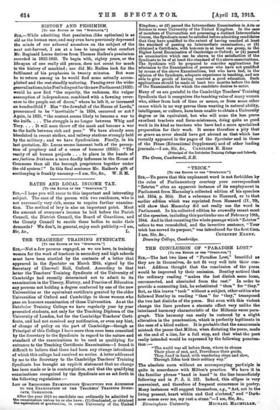THE TEACHERS' TRAINING SYNDICATE. [To THE EDITOZ OF TR% "
SPECTATOR.") BIR,—Not a few persons engaged, as we are here, in training women for the work of teachers in secondary and high schools must have been startled by the contents of a letter that appeared in the Spectator on March 29th, signed by the Secretary of Cherwell Hall, Oxford. According to that letter the Teachers' Training Syndicate of the University of Cambridge had recently determined not to admit to its examination in the Theory, History, and Practice of Education any persons not bolding a degree conferred by one of the new Universities or the equivalent certificate granted by the older Universities of Oxford and Cambridge to those women who pass an honours examination of those Universities. As at the Batchelor Training College we have regularly year by year presented students, not only for the Teaching Diploma of the University of London, but for the Cambridge Teachers' Certi- ficate, and had not received any notification, or even any hint, of change of policy on the part of Cambridge—though as Principal of this College I have more than once been consulted by the Secretary to the Syndicate in regard to the nature and standard of the examinations to be used as qualifying for entrance to the Teaching Certificate Examination—I found it difficult to believe that there had been any change introduced of which this college had received no notice. A letter addressed by me to the Secretary to the Cambridge Teachers' Training Syndicate has brought an explicit statement that no change has been made or is in contemplation, and that the qualifying examinations recognized by the Syndicate are as set forth in the following regulations :—
LIST OF RECOGNIZED EXAMINATIONS QUALIFYING FOR ADMISSION TO TEE EXAMINATION OF THE TEACHERS' TRAINING SYNDI- cATE, EASIEsILIDGE.
After the year 1913 no candidate can ordinarily be admitted to the examination unless boor she have: (1) Graduated, or obtained the equivalent of graduation, in some University of the United Kingdom ; or (2) passed the Intermediate Examination in Arts or Science in some University of the United Kingdom. In the case of members of Universities not possessing a distinct Intermediate Course, the Syndicate must be satisfied before admitting candidates that they havo qualified to the extent of having reached at least the standard of passing an Intermediate examination; or (3) obtained a Certificate, with honours in at least one group, in the Higher Local Examination of Cambridge or Oxford; or (4) passed an examination which can be shown to the satisfaction of the Syndicate to be of at least the standard of the above examinations. The Syndicate will be prepared to consider applications for admission to the Examination of persons who have not qualified by means of the above Examinations, but who have had, in the opinion of the Syndicate, adequate experience in teaching, and are able to give proofs of having received a good education. Such applications should be made at least two months before the date of the Examination for which the candidate desires to enter.
Many of us are grateful to the Cambridge Teachers' Training Syndicate that it recognizes the teaching value of many women who, either from lack of time or means, or from sonic other cause which in no way proves them wanting in natural ability, intelligence, or culture, have been unable to obtain a University degree or its equivalent, but who will none the less prove excellent teachers and form-mistresses, doing quite as good work in its kind as teachers who have had a more specialized preparation for their work. It seems therefore a pity that so grave an error should have got abroad as that which has recently appeared in the pages of the Spectator and in those of the Times (Educational Supplement) and of other leading journals.—I am, Sir, &c., CAROLINE E. RIG° (Principal of the Datchelor Training College and School),
The Grore, Camberwell, S.E.










































 Previous page
Previous page